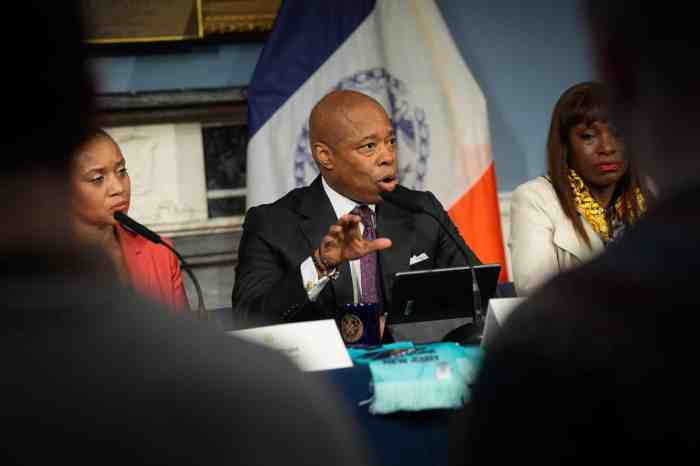Tom Duane, the openly gay Chelsea Democrat first elected to the New York State Senate in 1998, has announced he won’t seek re-election this November.
At a press conference on Monday, Duane — indicating he was tired of the Albany grind — said he wanted to spend more time in New York City.
Duane, 57, was elected to the Senate after seven years in the New York City Council, where he held the seat now occupied by Speaker Christine Quinn, who once served as his chief of staff. He made clear that his candidate to succeed him is Brad Hoylman, the chairperson of Community Board 2, who has jumped into the race.
At news of Duane’s surprising announcement, accolades poured in from his fellow progressive politicians, who hailed his accomplishments and leadership, especially, but not only, on gay rights.
During Duane’s time in the Senate, the state enacted hate-crimes legislation that included protections for gay and lesbian New Yorkers, adopted a gay rights law, and put in place school anti-bullying protections based on categories including sexual orientation and gender identity and expression –– all measures on which he served as lead sponsor.
The most significant advance for L.G.B.T. rights during Duane’s time in the Senate came in June 2011 when New York enacted a marriage equality law with the strong support of Governor Andrew Cuomo.
In addition to those measures, Duane was also the longtime sponsor of the Gender Expression Non-Discrimination Act (GENDA), a transgender civil rights measure passed five times in the Assembly but consistently stalled in the Senate.
With a mix of frustration and determination, Duane said he would press this year to secure enactment of a rent cap — pegged at 30 percent of their income — for clients of the H.I.V./AIDS Services Administration who live in privately owned housing. An anomaly in state law forces HASA clients without rental cap protection to pay up to 70 percent of their income on housing, leaving them with less than $15 per day for their other expenses.
In 1994, Duane challenged West Side Congressmember Jerry Nadler in the Democratic primary. In a district that included sections of Brooklyn as well as Manhattan, however, Nadler dispatched Duane by a roughly two-to-one margin.
While on the Council, Duane fought hard to keep Mayor Rudy Giuliani accountable for the performance of HASA, then known as the Division of AIDS Services (DAS). Duane also worked to enact the state’s first domestic partnership law, but the contentious relationship between him and Giuliani frustrated his efforts. Giuliani eventually pushed through his own domestic partnership law, similar to Duane’s, but gave the gay councilman no credit.
Hoylman’s running for Duane’s seat opens up the race for the Third District Council seat, which Quinn must leave due to term limits in 2013. Hoylman had been an expected front-runner in that election, but with Hoylman now setting his sights on Albany, fiery preservationist Andrew Berman is saying he’s seriously considering a run for the Council. Previously, it wasn’t clear if Berman would, in fact, jump into the race. C.B. 4 Chairperson Corey Johnson is mulling whether to run for state Senate, but it sounds like he may keep his focus on the Council race, where activist Yetta Kurland is also an anticipated candidate. Hoylman’s run for the state Senate will also open the upcoming C.B. 2 chairperson election to new candidates.
State legislators don’t have term limits, but Duane’s stepping down shows how change in Albany can send out ripple effects.
It’s hard to believe that Duane — such an important figure on the Downtown political scene for so long — will really be leaving the Senate after the end of this year. We’ll miss him, all his great work and his dedication, as well as his sense of humor and his humanity.


















